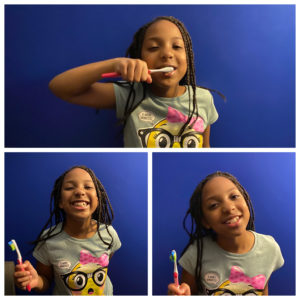My one-year-old son, Maxwell, carries his stuffed toy Elmo everywhere with him: in the car, in his high chair, and to bed. Elmo endures a lot, as Maxwell’s favorite toy. He is often thrown to the ground, dragged around the house and sat upon. Max’s sweetest moments with Elmo, though, are when he is taking care of him. He hugs him, kisses him, and (very enthusiastically) brushes his teeth. Max is simply mimicking the nighttime routine of our house, and I could not be more proud.
February is National Children’s Dental Health Month and the perfect time to educate your child about proper dental health. Parents should begin taking care of their children’s teeth when the first tooth appears. After meals, wipe your baby’s teeth with a damp washcloth or piece of gauze. The American Academy of Pediatric Dentistry (AAPD) recommends using a rice-grain-sized smear of toothpaste for babies and toddlers, graduating to a pea-sized dollop by age 3.
The AAP recommends that all infants receive oral health risk assessments by 6 months of age. Every child should have a dental home established by 12 months of age. What if your child is older than that and hasn’t visited the dentist yet? Make an appointment with a family dentist as soon as you can. They will not make you feel bad for not coming earlier.
When I had my first child, Reya, I did not know the AAP recommendations; she did not take her first dentist trip until she was 5. Our family dentist made the first visit (and all future visits) comfortable and painless. Luckily, she had no cavities or dental issues, but I still felt bad for not being more knowledgeable about dental health. Like the saying goes, though: When you know better, then do better.

Reya, 9, flashing her pearly whites
Children two and older should use toothpaste to prevent decay. Parents should encourage young children (2-7 years old) to brush their own teeth, but follow up and brush their child’s teeth again to ensure they are thoroughly cleaned. Children eight years old and older have the dexterity to brush their teeth independently. Encourage your child to hold the toothbrush at a 45-degree angle against the gums. Move back and forth gently over the front, back and tops of the teeth.
Some additional helpful tips for oral health are:
- Provide plenty of water for your child, as it will prevent tooth decay.
- Be a role model for your child by demonstrating good dental health habits. Those little eyes are always watching and mimicking what you do.
- Keep dental appointments and communicate with your child about what they can expect at the dentist.
- Eat healthy foods to prevent decay
- Save sweet treats for after meals because this is when the amount of saliva produced in the mouth is greater (and will protect your child’s teeth)
- Serve milk or cheese when you give your child sweet snacks. Dairy acts as a buffer to the acids produced by bacteria and decreases the possibility of tooth decay. Have your child brush their teeth at least twice a day for two minutes. Set an alarm on your phone or digital assistant devices (Alexa, Cortana, Siri, Google Home, etc)
- Don’t share utensils, sippy cups, bottles, or other items with your child. Bacteria can be passed from your mouth to theirs. Make sure to sanitize all items to prevent bacterial infections.

Maxwell tilts Elmo’s head back to make sure his back teeth are brushed. When the two-minute timer goes off, he rinses Elmo’s mouth with “pretend water” and triumphantly declares, “Allllll done!” If this is any indication of my son’s future dental health, then he has a bright, shiny smile awaiting him in the years to come.









